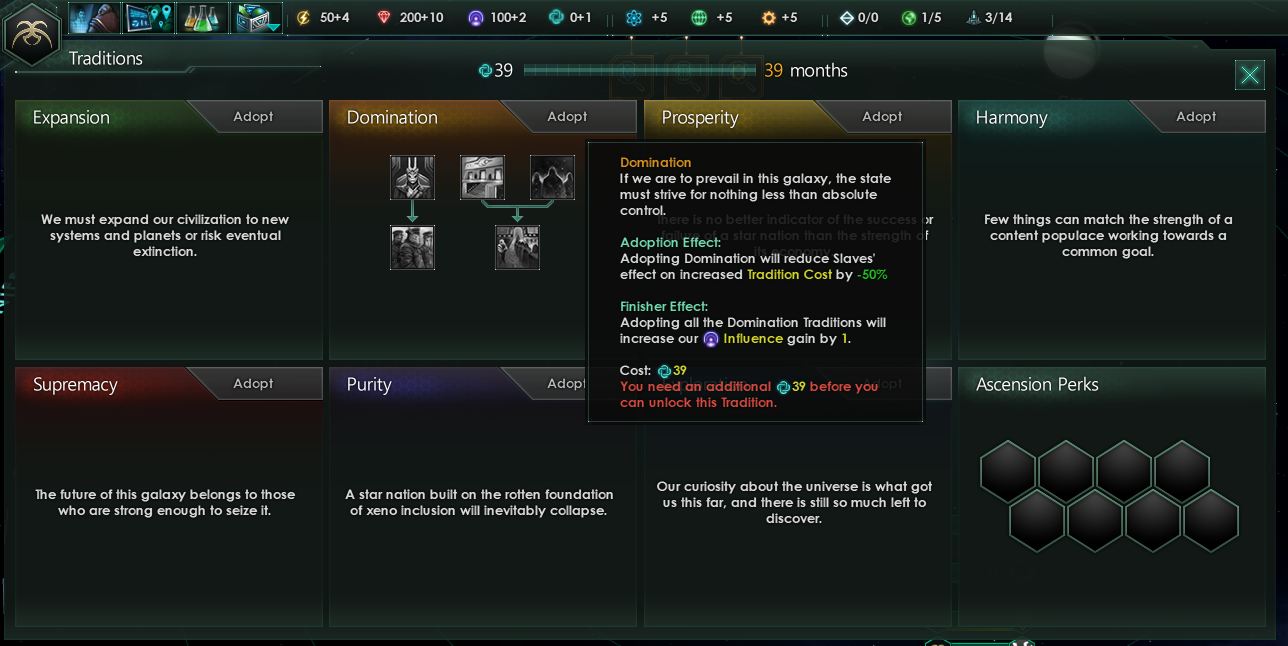Hello everyone and welcome to another Stellaris development diary. Today we'll be talking about a new feature coming in the 1.5 'Banks' update called Traditions and Unity. As before, I can't talk about when Banks will be coming out, only that it's a while away and we have quite a few dev diaries to go through before we get there 
Traditions and Unity
One thing we have mentioned as a big priority for Stellaris is adding more empire customization and more ability to roleplay diverse empires. We have also talked about our desire to allow for the existance of 'tall' empires. Traditions and Unity is a feature that aims to tackle both these topics by adding 7 new Tradition trees and a resource called Unity that is used to unlock them. Unity is an accumulative resource that increases each month, and is primarily gained through the construction of government buildings such as monuments, mausoleums and temples. Unity is spent on adopting Tradition trees and purchasing individual Traditions. Each Tradition tree has a starter bonus, five unlockable bonuses and a finisher bonus that is gained once the entire tree is filled out.

The seven Tradition trees are as follows:
Expansion: Focuses on growth through rapid colonization.
Domination: Focuses on maintaining control over your population and subjects.
Prosperity: Focuses on economic growth.
Harmony: Focuses on maintaining a happy and diverse population.
Supremacy: Focuses on growth through military conquest.
Purity: Focuses on strength through homogenity and dominion over other species.
Exploration: Focuses on exploration and scientific discovery.

The cost of unlocking a Tradition depends on the size of your empire, as well as how internally stable it is. Unhappy factions, minority species and slaves all increase the cost of adoption Traditions further, though these effects can be offset or even canceled out entirely by adopting the right Traditions for the empire you intend to build. Overall, small harmonious empires will unlock Traditions more quickly than large, expansionistic ones. Which Traditions you unlock also has a significant impact on the ethics of your population, and so can be a useful tool to either strengthen your existing empire ethics or further a planned empire-wide shift towards a different set of ethics altogether.
You may have noticed a certain part of the Traditions screen that I have not yet mentioned in this dev diary. That's because it's actually the subject of the next dev diary! However, since the Christmas holidays are coming up, most of the Stellaris team will be away, so dev diaries will be on hiatus until January 12th. Tune back in then to find out all about the Ascension Perks and how you can use them to build the empire of your dreams.
Traditions and Unity
One thing we have mentioned as a big priority for Stellaris is adding more empire customization and more ability to roleplay diverse empires. We have also talked about our desire to allow for the existance of 'tall' empires. Traditions and Unity is a feature that aims to tackle both these topics by adding 7 new Tradition trees and a resource called Unity that is used to unlock them. Unity is an accumulative resource that increases each month, and is primarily gained through the construction of government buildings such as monuments, mausoleums and temples. Unity is spent on adopting Tradition trees and purchasing individual Traditions. Each Tradition tree has a starter bonus, five unlockable bonuses and a finisher bonus that is gained once the entire tree is filled out.

The seven Tradition trees are as follows:
Expansion: Focuses on growth through rapid colonization.
Domination: Focuses on maintaining control over your population and subjects.
Prosperity: Focuses on economic growth.
Harmony: Focuses on maintaining a happy and diverse population.
Supremacy: Focuses on growth through military conquest.
Purity: Focuses on strength through homogenity and dominion over other species.
Exploration: Focuses on exploration and scientific discovery.

The cost of unlocking a Tradition depends on the size of your empire, as well as how internally stable it is. Unhappy factions, minority species and slaves all increase the cost of adoption Traditions further, though these effects can be offset or even canceled out entirely by adopting the right Traditions for the empire you intend to build. Overall, small harmonious empires will unlock Traditions more quickly than large, expansionistic ones. Which Traditions you unlock also has a significant impact on the ethics of your population, and so can be a useful tool to either strengthen your existing empire ethics or further a planned empire-wide shift towards a different set of ethics altogether.
You may have noticed a certain part of the Traditions screen that I have not yet mentioned in this dev diary. That's because it's actually the subject of the next dev diary! However, since the Christmas holidays are coming up, most of the Stellaris team will be away, so dev diaries will be on hiatus until January 12th. Tune back in then to find out all about the Ascension Perks and how you can use them to build the empire of your dreams.


